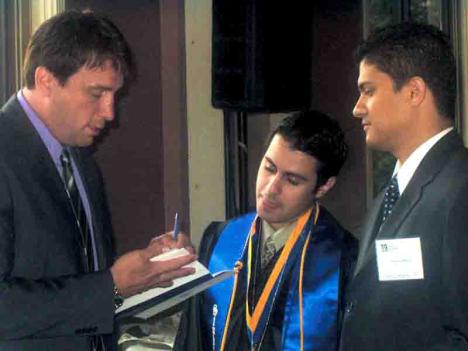and you thought you had problems?
May 19, 2003
Finals got you down? Worried about what to wear to that summer wedding? Take a load off and see the UMB Classics Club’s rendition of King Oedipus, the tale of a man with real problems. Oedipus was the unlucky fella who killed his mother and married his father; the play is how he finds this out and the wacky things he does afterward (stabs out his eyes). Contemplating that ought to put your GPA in perspective.
The Classics Club opened their lean, mean version of King Oedipus at the Snowden Auditorium on Friday, and have two more shows this week. They faced impossible odds against the opening night of experimental modernist Shakespeare, whose Twelfth Night ran the weekend in the McCormack Theater, but showed off a tremendous amount of effort and devotion to their casus theatrum and ran an exciting, quirky and fast-paced Oedipus that didn’t overreach itself.
The Classics Club is using the W.B. Yeats translation of Oedipus Rex, written by Sophocles around 430 B.C. You’d think it might be a little out of date by now, but for those that have never had the pleasure, King Oedipus is one of the finest examples of drama ever written. Its tight, lean dialogue and lack of embellishment keep the watcher spellbound throughout. Occasionally called, “the perfect play” for its plot and narrative structure, Oedipus is in every respect as contemporary as Arthur Miller, as sensual as Tennessee Williams and far more daring performance artist Karen Finley. After all, what’s a naked smeary woman next to a man who sleeps with his mother and bumps off his old man?
Oedipus has not survived the ages by being unwatchable; in fact, it’s the ancient Greek equivalent of a slow-motion train wreck; you can’t stop watching even though you know it’s going to be a mess.
The Classics Club, unlike their Elizabethan cross-campus rivals, has the advantage of modern English to work with. Yeats’ translation has a good deal of understated wit in it and Frederic Norton (Oedipus) makes the most of it, remarking dryly “Yes, it would have been good if the Phoebus had told us that,” on learning that the oracle didn’t mention Laius’ (Oedipus’ pop) murderer. Of course, we all know that Oedipus did it, so the funny part is Norton delivering the line with tongue firmly in cheek. Norton’s Oedipus in general is excellent. He has a firm voice and a perfect handle of the range of the character, and isn’t afraid to rough up his slightly more inhibited fellow actors and chew the scenery a bit.
Not that there is any; Director Tom Olivieri (straight man Creon) has made a black box theater Oedipus. There is nothing on the stage except the actors, the chorus, and the floorboards. The stark look is appropriate for the play and the simple costumes flatter all the players. The Classics Club actors aren’t very polished and the blocking is a little awkward at times, but they are perfectly earnest and they know their material well. One striking image occurs as Norton manages to get well forward of the stage lights and the semi-gloom obscures his eyes entirely, washing down the planes of his face in an eerie foreshadowing of his fate.
The play’s music is entirely composed by Producer Daniel Smith, who plays wisecracking soothsayer Tiresias. The chorus sings their lines with aplomb, led by talented vocalist Rachel Tisdale who also sings a solo entirely in ancient Greek, a haunting and evocative lamentation that is a high point. Dressed in masks to preserve their place as audience and players, the chorus makes an evocative human backdrop to the action.
It’s a great play, and a spirited, heartfelt and strong rendition by the Classics Club. If you’re worried you’ll have to kill yourself after seeing it, don’t be: the best part about it, now as always, is that it happened poor old Oedipus and not to us. After all, what can the shadowlike generations of man achieve?
King Oedipus plays at 8 pm Thursday and Friday nights at the Snowden Auditorium.






















































